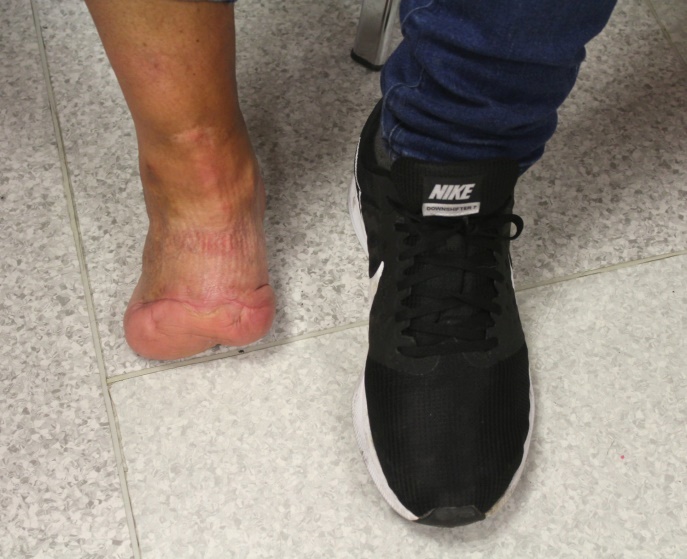Amputee Mark Joiner is urging diabetic patients who may have avoided raising the alarm during the Covid-19 pandemic to make sure they speak up if they notice any changes in their feet so they can be referred for help as early as possible.
Mark, of Walsall, was diagnosed with Type 1 diabetes when he was eight years old but admits that through most of his childhood he neglected his condition.
Fast forward to 2010. He was a foundry worker in a manufacturing company and a heavy gym goer – this was taking a real toll on his feet.
After numerous infections and pain, in 2016 Mark’s foot “exploded” he says. By the time he reached hospital his toes were no longer attached to his foot which led to him having an amputation.
The 39-year-old often reflects back on his actions and how an early referral might have saved his foot.
He said: “You don’t always understand the risks and complications of diabetes. It’s easy to overwhelm yourself with all the things to worry about so I just ignored most signs and symptoms and got on with it.
“However, after I had my foot amputated I can honestly say it was the best thing that ever happened to me because I had been feeling so unwell for so long.
“Looking back now if I had listened to the team and what professionals had to say I would probably still have my foot. I could have prevented this.”
He added:
“I want people to know – especially with the covid-19 pandemic – not to wait on the symptoms.
“Diabetes is a serious condition and the only way to prevent long term damage is early referral.
“The best advice you will ever hear with diabetes is to get it diagnosed as early as possible so you can do something about it. Please don’t ignore the symptoms like I did. I wish I had listened.”
Walsall Healthcare NHS Trust Diabetes Specialist Podiatrist, Lindsey Phillips said: “We thank Mark for sharing his story and hope it makes people sit up and take notice.
“Having diabetes means you’re at much greater risk of developing foot problems.
“This is because raised blood glucose, also known as blood sugar, can damage the sensation in your feet.
“It can also affect your circulation, which can lead to you getting less blood supply to your feet. Without a good blood supply you may have problems with cuts and sores healing. You may also get cramps and pain in your legs or feet.
“If you don’t get these problems treated, they could lead to foot ulcers, infections and, at worst, amputations. Most foot problems can be prevented with good, regular foot care.”
She added:
“Even throughout covid-19 the diabetic foot team based on route 004 at Walsall Manor Hospital has been running its service. We are urging patients to please attend all appointments and for GPs to send referrals as usual.
“It is incredibly important to continue to treat diabetic foot problems to prevent hospital admissions and amputations from occurring.
“At the first sign of any foot problems such as open wounds, weeping, redness, swelling or any unusual changes in your feet please make sure you go and see your doctor or your practice nurse as soon as possible to get a referral to us. The quicker we see you the better.”
For tips on how to look after your feet if you have diabetes please click here: https://www.nhs.uk/live-well/healthy-body/foot-care-diabetics/
Walsall Healthcare NHS Trust’s diabetes service has been significantly expanded in recent years thanks to NHS England funding to improve outcomes for people with diabetes.


